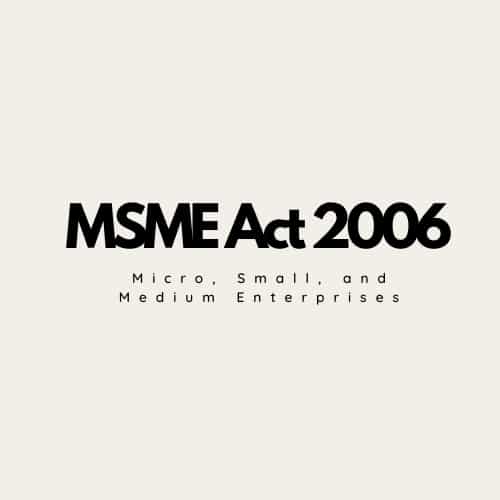The MSME Act 2006 (Micro, Small, and Medium Enterprises) is a significant legislation that aims to promote and support the growth of small businesses in India.
This act provides a legal framework for the recognition, development, and enhancement of MSMEs, which play a crucial role in the country’s economic development.
By defining the criteria for categorizing enterprises as micro, small, or medium, the act ensures that these businesses receive the necessary benefits and support from the government, financial institutions, and other stakeholders.

It also establishes mechanisms for the resolution of disputes and grievances faced by MSMEs, thereby fostering a conducive business environment for their sustainable growth.
Definition of Micro, Small and Medium Enterprises
Since the 1950s, Small Scale Industries (SSIs) and later MSMEs have been classified based on the amount of money they invest in machinery for manufacturing units and equipment for service enterprises. However, in 2017, the Union Cabinet gave the green light to a proposal that aimed to alter the definition of MSME. The new definition is based on annual turnover or revenue. But this proposal has not been approved.
But, on May 13th, 2020, the Central Government made changes to the definition of MSMEs (as a way to introduce a financial package aimed at boosting the economy that has been severely impacted by Covid 19).
The new definition is as follows:
Microenterprise: A micro enterprise is a unit where the investment is up to 1 crore and the annual turnover is up to 5 crores.
Small enterprise: A small enterprise is one where the investment is up to 10 crores and annual turnover is up to 50 crores.
Medium enterprise: A medium-sized enterprise refers to a business that has an investment of up to 20 crores and a turnover of up to 100 crores.
| Enterprise Size | Investment (in crores) | Annual Turnover (in crores) |
|---|---|---|
| Micro | Up to 1 | Up to 5 |
| Small | Up to 10 | Up to 50 |
| Medium | Up to 20 | Up to 100 |
The above definition is in terms of investment (in plant and machinery and equipment) and turnover. Now there is no difference between manufacturing enterprises and service enterprises (the difference has been removed).
MSME Development Act 2006 (Micro, Small and Medium Enterprises Development)
To enhance the growth of small businesses in the nation, the Indian Government has implemented the “MSME Development Act 2006 (Micro Small and Medium Enterprises Development) .”. Under the Act, the Central Government shall set up, for the Act, a Board known as The National Board for Micro, Small and Medium Enterprises.
Salient Features of MSME Act 2006
The main characteristics of the MSMED Act 2006 can be summarized as follows:
- Under this Act, a National Board for MSMEs is established as a legal body that serves as a platform for making important policy decisions and implementing programs for the development of MSMEs.
- The Act provides for the definition of the “Small Enterprise” and “Medium Enterprise” which were not statutorily defined earlier.
- The Act allows for the creation of the National Board for Micro Micro, Small, and Medium Enterprises. This board is a legal entity that serves as a platform for important discussions and decisions regarding policies and programs aimed at developing MSMEs.
- Additionally, the Act also includes provisions for categorizing Micro, Small, and Medium Enterprises based on their investments in plant and machinery or equipment. It also establishes an Advisory Committee to provide recommendations on matters related to these enterprises.
The earlier concept of ‘Industries’ has been changed to ‘Enterprises’. Enterprises have been classified broadly into:
- Companies are involved in the creation of products related to various industries.
- Enterprises engaged in providing/rendering services.
Manufacturing companies are typically described based on the amount of money they invest in equipment and machinery, not including land and buildings.
These companies can also be further categorized into different groups.
- Micro enterprises – investments up to 25 lakh.
- Small Enterprises – investment above 25 lakh & up to 5 crore;
- Medium Enterprises– investment above 5 crore & up to 10 crore.
These enterprises are categorized based on their investment in equipment, excluding land and buildings.
- Micro Enterprises – investment upto 10 lakh;
- Small Enterprises – investment above 10 lakh & up to 2 crore;
- Medium Enterprises – investment above 2 crore & up to 5 crore.
The complex two-stage registration process of SSI has been substituted with an optional filing of memorandum by Micro, Small & Medium Enterprises.
- The Act grants additional authority to the Central Government to announce initiatives, rules, or directions that will support and advance Small and Medium Enterprises (SMEs). These initiatives may include financial assistance, funding, grants, and the efficient utilization of funds provided by the Central Government and Administration.
- Furthermore, the Act introduces amendments to the Interest on Delayed Payments to Small Scale and Ancillary Industrial Undertaking Act of 1993. These amendments aim to safeguard the interests of MSMEs and provide them with significant protection, as outlined in Chapter V of the Act.
- Additionally, the Act establishes a Facilitation Council, which will be composed of a minimum of three and a maximum of five members. The council’s purpose is to facilitate and streamline processes for SMEs.
- The Act established specific funds for the promotion, development, and enhancing competitiveness of MSMEs.
- The Act made notification of schemes and programs for this purpose.
The Crucial Role of MSMEs in the Indian Economy: GDP, Employment, and More
Micro, Small, and Medium Enterprises (MSMEs) are the lifeblood of the Indian economy, playing a vital role in its progress and advancement. Here’s why:
Significant Contribution to GDP:
- Estimated contribution: Around 30% of India’s GDP (as of 2020), with the government aiming to increase it to 50%.
- Impact across sectors: From manufacturing and services to agriculture and trade, MSMEs are actively involved in various sectors, promoting overall economic diversification.
The engine of Employment Generation:
- Largest job creator: Over 110 million people are employed by MSMEs, making them the largest job provider in India.
- Rural development: A significant number of MSMEs operate in rural areas, offering crucial employment opportunities and contributing to balanced regional development.
- Skilled and unskilled workforce: MSMEs hire both skilled and unskilled workers, contributing to inclusive growth and poverty reduction.
Beyond Numbers: Additional Benefits:
- Promoting entrepreneurship: MSMEs foster a culture of innovation and risk-taking, inspiring individuals to start their businesses.
- Flexibility and adaptability: MSMEs often have smaller structures and quicker decision-making abilities, enabling them to adapt to changing market demands more efficiently.
- Social impact: By providing employment and income opportunities, MSMEs contribute to social empowerment and poverty alleviation, particularly in rural areas.
Examples of MSME Impact:
- A small garment factory in a rural area employs hundreds of women, granting them financial independence and valuable skills.
- A local food processing unit sources agricultural products from nearby farmers, boosting rural incomes and reducing food waste.
- A technology startup develops an innovative app, creating jobs and contributing to the growth of India’s digital economy.
Objectives MSME Act 2006
The MSME Act 2006 has set out clear goals to empower small businesses in India. These objectives can be categorized into three main areas:
Promotion:
- Encouraging new businesses: The Act aims to simplify the registration process and foster an entrepreneurial culture, making it easier for individuals to start their ventures.
- Creating awareness and outreach: The Act promotes government schemes and support programs that are available to MSMEs, ensuring that business owners are aware of the resources and assistance they can access.
- Skill development: The Act focuses on enhancing the skills and knowledge of MSME entrepreneurs and their workforce, enabling them to adapt to changing market demands and improve their competitiveness.
Development:
- Access to finance: The Act facilitates easier access to credit for MSMEs, including credit guarantees and penalties for delayed payments. This helps small businesses overcome financial barriers and grow their operations.
- Technology advancement: The Act encourages the adoption of technology through subsidies, incubation centers, and technology transfer mechanisms. This enables MSMEs to stay updated with the latest advancements and improve their productivity.
- Infrastructure development: The Act emphasizes the importance of providing MSMEs with access to industrial estates, shared facilities, and other infrastructure support. This ensures that small businesses have the necessary resources to operate efficiently.
Enhancement of Competitiveness:
- Reservation of products: Certain products are exclusively reserved for production by MSMEs, giving them a competitive advantage in the market.
- Procurement preference: The Act ensures that the government and public sector undertakings prioritize procurement from MSMEs, expanding their market access and opportunities.
- Dispute resolution: The Act establishes a dedicated forum for the faster and cheaper resolution of MSME-related disputes, ensuring that small businesses can address any issues they may encounter promptly.
Impact and Recent Developments of the MSME Act 2006:
The MSME Act 2006 has had a significant impact on the Indian MSME sector and there have been recent developments that further shape its influence. Let’s take a closer look:
Positive Impact:
- Increased MSME numbers: Since the implementation of the Act, there has been a noticeable growth in the number of registered MSMEs. This indicates a thriving ecosystem where more businesses are being established.
- Improved access to finance: The Act has made it easier for MSMEs to access credit and has introduced penalties for delayed payments. This has helped businesses operate smoothly by providing them with the necessary financial support.
- Enhanced market access: The Act has reserved certain products for MSMEs and has given them preference in government procurement. This has created crucial market opportunities for MSMEs, allowing them to expand their reach.
- Simplified legal framework: The Act has streamlined the registration processes for MSMEs and has established a dedicated dispute resolution forum. This has reduced legal hurdles for businesses, making it easier for them to operate within the legal framework.
Challenges Remain:
- Financing gap: Despite the positive impact of the Act, there is still limited access to affordable credit, especially for micro-enterprises. This continues to be a major hurdle for MSMEs.
- Technology adoption: Many MSMEs face difficulties in adopting newer technologies due to a lack of awareness, funds, or skillsets. This hinders their ability to compete in the market and grow.
- Formalization: A significant portion of the MSME sector remains informal, which hampers their access to benefits and inhibits their overall growth potential.
- Competition from larger companies: MSMEs face tough competition from established players, both domestic and international. This poses a challenge for smaller businesses to thrive and expand.
Recent Developments:
- MSME Definition Revisions (2020): In 2020, the investment and turnover limits for micro, small, and medium enterprises were revised based on current economic realities. This ensures that the definition of MSMEs remains relevant and up-to-date.
- PMSWAN Nidhi Scheme (2020): This scheme introduced in 2020 facilitates collateral-free loans for MSMEs through peer-to-peer lending platforms. It provides additional financial support to MSMEs, enabling them to grow and expand their operations.
- Self-Reliant India Initiative (2020): The Self-Reliant India Initiative, launched in 2020, emphasizes the promotion of local manufacturing. MSMEs
Conclusion
In conclusion, the MSME Act 2006 has been instrumental in empowering and uplifting small businesses in India. By providing a comprehensive legal framework, this act has facilitated the recognition and development of MSMEs, enabling them to contribute significantly to the country’s economy.
The act’s provisions for financial assistance, incentives, and dispute-resolution mechanisms have played a crucial role in creating a favorable business environment for MSMEs.
As a result, these enterprises have been able to thrive, generate employment opportunities, and contribute to the overall socio-economic progress of the nation. The MSME Act 2006 stands as a testament to the government’s commitment to fostering the growth and sustainability of small businesses in India.
Resources for the MSME Act 2006:
Official Government Websites:
- Ministry of MSME: https://msme.gov.in/
- MSME Samadhaan: https://samadhaan.msme.gov.in/
- National Board for MSME: https://www.nsic.co.in/
Act and Regulations:
- Micro, Small and Medium Enterprises Development Act, 2006: https://samadhaan.msme.gov.in/WriteReadData/DocumentFile/MSMED2006act.pdf
- National Board for MSME Rules, 2006: https://www.nsic.co.in/
Information and Resources:
- MSME Samadhaan Helpdesk: https://samadhaan.msme.gov.in/
- MSME Development Institutes (MDIs): https://msme.gov.in/about-us/training-institutes
- Small Industries Development Bank of India (SIDBI): https://en.wikipedia.org/wiki/Small_Industries_Development_Bank_of_India
Additional Resources:
- FICCI MSME: https://beta.ficci.in/sector-details.asp?sectorid=36
- Confederation of Indian Industry (CII): https://en.wikipedia.org/wiki/Confederation_of_Indian_Industry
- National Institute for Entrepreneurship and Small Business Development (NIESBUD): https://niesbud.nic.in/










whoah this weblog is great i love reading your posts. Keep up the good
work! You recognize, many people are searching arouynd for
this information, you could aid them greatly.
Thank you so much for your kind words! I’m thrilled to hear that you enjoy reading the posts. I’ll definitely keep the content coming. It’s great to know that the information is helpful to many. Your support means a lot!
What’s up, I would like to subscribe for this webpage
to obtain most up-to-date updates, therefore where can i do iit
Thanks 😊
Appreciate this post. Will try it out.
Hey, thanks so much! I’m glad you liked the post. Can’t wait to hear how it goes when you try it out! 😊
Hey, I think your blog might be having broowser cokmpatibility
issues. When I look at your blog in Safari, it looks fine but
when opening iin Internet Explorer, it hhas some
overlapping. I just wanted to give you a quick heads up!
Other then that, wonderful blog!
Hey! Thanks for the heads up about the browser compatibility issues. It’s super helpful to know that everything looks good in Safari but not in Internet Explorer. We’ll definitely look into that! Glad you’re enjoying the blog overall—appreciate your support! 😊
Thank you for the good writeup. It in reality was a leisure account it.
Look complex to more delivered agreeable from you!
However, how can we be in contact?
Hey! Thanks a ton for the kind words about the write-up! I’m really glad you enjoyed it. 😊 I’d love to stay in touch! You can reach me through email. It will be available on Contact us page. Looking forward to connecting!
I for all time emailed this weblog post page to all my contacts,
aas if like to read it afterward my contacts
will too.
Hey there! That’s awesome to hear! It’s great that you’re sharing the love for our blog post with your friends. We hope they enjoy it just as much as you do! Thanks for spreading the word! 😊